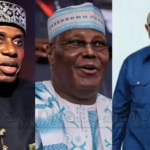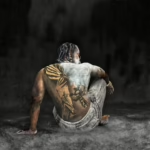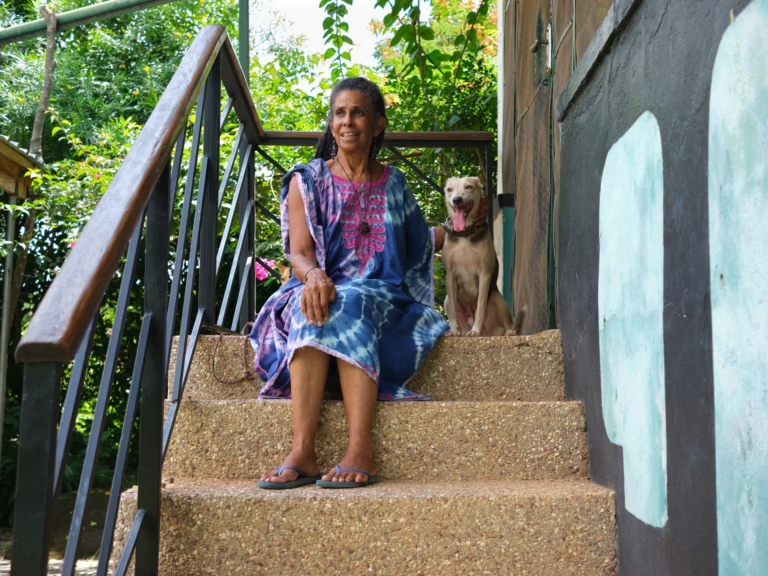Accra, Ghana – Ashley Haruna, a 28-year-old health coach, never planned to settle in Ghana. However, her perspective shifted dramatically when she found herself inside a dim prison cell at Cape Coast Castle. As the guide recounted how many enslaved Africans were shipped from this very site to places like Haiti, Haruna experienced a profound connection.
Raised in the United States by Haitian parents, she suddenly recognized that her forebears might have passed through this exact location. “This land, this place,” she recalls thinking. “I wasn’t searching for it, but it found me.”
That emotional awakening deepened after she returned to Ohio. Within months, and with her family’s hesitant blessing, she made the decision to relocate permanently to Ghana in December 2021, joining a growing number of African Americans eager to reconnect with their ancestral roots.
Ghana’s history of welcoming the African diaspora dates back to the 1950s when its first president, Kwame Nkrumah, actively encouraged Black Americans to return as part of his Pan-African vision. During the civil rights era, prominent figures such as W.E.B. Du Bois, Marcus Garvey, and Maya Angelou were invited to settle in Ghana, with Du Bois and Angelou eventually making the move.
Today, Ghana continues to foster ties with the diaspora. The 2019 “Year of Return,” commemorating 400 years since the first enslaved Africans arrived in Virginia, saw over 200 individuals from the US and Caribbean granted Ghanaian citizenship. Building on this momentum, the 2024 “Beyond the Return” initiative has already welcomed 524 new citizens from the diaspora, including Haruna.
Yet, as Haruna’s experience reveals, establishing a new life in Ghana is not without its hurdles.
Villa Diaspora: A Sanctuary for Returnees
Haruna’s initial residence was a remote apartment two hours north of Accra in Ghana’s Eastern Region. Contrary to her hopes of quickly blending into a local community, she found herself isolated. With no nearby markets and no one to guide her through everyday tasks-like using a gas stove or managing water outages-she felt increasingly alienated and frustrated.
Remembering a YouTube video she had watched back in the US about Villa Diaspora, a co-living space designed to support African Americans relocating to Ghana, Haruna sought it out. The villa’s owner, Michelle Konadu, herself a returnee, offers newcomers a supportive environment to ease their transition. Within a week, Haruna moved into the villa located in an affluent Accra suburb.
Sharing communal spaces with other African-American residents, she quickly learned how to navigate Ghanaian bureaucracy, cultural norms, and daily life-from obtaining identification cards to mastering polite greetings.
When Haruna suffered injuries in a car accident, it was Konadu and the villa community who provided crucial support. Though Haruna eventually moved out, she continues to rely on Konadu as a trusted resource.

Seeking Renewal and Connection
Michelle Konadu intimately understands the complexities of straddling two cultures. Raised in New York City by Ghanaian parents, her family home was a hub for visiting relatives and friends. It wasn’t until a 2015 trip to Ghana for a funeral that she seriously considered relocating from the fast-paced life of New York to the more relaxed rhythm of Ghana.
Despite initial hopes, Konadu often felt caught between identities-“too American for Ghana, too Ghanaian for America.” A cousin named Alfred helped her acclimate by teaching her local customs, such as how to navigate markets, hail a trotro (minibus taxi), and observe cultural etiquette like greeting elders respectfully and avoiding gestures with the left hand.
Recognizing that many returnees lack such guidance, Konadu launched Villa Diaspora in 2017. This three-bedroom co-living space, adjacent to her family home in Kwabenya, offers newcomers a ready-made community. She assists tenants with everything from school enrollment and land acquisition to social integration through sports and clubs.
“Most come here with a soul mission,” Konadu explains. “They seek healing, reconnection, or a fresh start. For many, moving to Africa is a lifelong dream, but locals may not always grasp that.”

While her family initially struggled to understand her decision to return, Konadu now reassures others that their loved ones will find support during their early months in Ghana. After a decade in the country, she believes that if newcomers can thrive at Villa Diaspora, they can successfully integrate into broader Ghanaian society.
She points to the Brazilian-descended Tabom community in Jamestown, Accra, as a model of successful integration. These descendants of formerly enslaved Africans who returned from Brazil in the 19th century have blended their Afro-Brazilian heritage with Ga traditions, adopting local language and customs while preserving their unique identity. Konadu envisions a similar future for today’s returnees, where African-American culture flourishes within Ghana’s social fabric.
Haruna acknowledges that assimilation is a gradual process and admits that returnees often enjoy privileges not afforded to many Ghanaians. Her lighter skin tone and American accent frequently open doors, resulting in faster service, helpful locals, and smoother dealings with officials-advantages she finds both surprising and uncomfortable given the racial dynamics she experienced in the US.
“I’m Ghanaian, but I’m also a returnee,” Konadu reflects. “Our connection has always existed, but the ‘Year of Return’ brought it into sharper focus.”
However, this heightened visibility and the concentration of returnees in certain neighborhoods, combined with rising living costs, have sparked some tensions.

Unseen Realities of Ghana
Anthony Amponsah Faith, a 32-year-old entrepreneur who rents vehicles and drives clients-including many returnees-across Ghana, has gained new perspectives through his work. Thanks to his clients, he has explored hidden gems like the Nzulezu stilt village and waterfalls in the country’s middle belt. “Before, I barely traveled. Now, I’ve seen much of Ghana,” he shares.
Amponsah has observed the emotional impact of visits to slave castles and memorials on his African-American passengers. Yet, he also witnesses cultural clashes firsthand. Returnees often settle in affluent neighborhoods with reliable electricity, paved roads, and access to amenities, while many locals endure intermittent water supply and power outages. Returnees complain about these inconveniences, but locals accept them as everyday realities. He recalls a client who insisted he was being overcharged because “Ghana should be cheap.”
One night, Amponsah woke to find his room flooded, his mattress floating in water. “That’s the Ghana they don’t see,” he remarks. “Flooding doesn’t happen in the areas where returnees live.”
He expresses frustration over soaring housing costs, which he attributes to returnees’ willingness to pay premium prices. “They come from places with higher incomes, so it doesn’t seem expensive to them. But I blame the government for not creating equal opportunities.”
In 2019, Amponsah rented a small studio for 120 cedis ($10-12) monthly; today, the same costs 450 cedis ($42-44). “The rising cost of living makes finding housing daunting,” he says. Though he wishes to live closer to his clients, many of whom reside an hour away, affordability keeps him distant.

Creating a Community from the Ground Up
While many returnees wrestle with feelings of guilt over their relative economic advantages, some Ghanaians carry a quiet weight linked to their ancestors’ involvement in the transatlantic slave trade. This has led certain traditional leaders to offer land to diaspora members as a form of reconciliation.
Two notable diaspora settlements, Fihankra and Pan African Village, have emerged from such gestures, alongside other gated communities under development for returnees.
Dawn Dickson, a 46-year-old entrepreneur and investor, relocated to Ghana in 2022, seeking a life where she wouldn’t be a minority. Tracing her lineage to the Akan people of Ghana and Ivory Coast, she was drawn to the warmth and familiarity of the local culture. When she began searching for land, she discovered a cluster of diaspora buyers around Asebu town in the Central Region, where a local chief had allocated approximately 20,000 plots for diasporans.
“The excitement of helping build a town from scratch was irresistible,” Dickson explains.
She purchased land and founded a company to assist other African Americans in acquiring and constructing homes. Employing sustainable rammed earth building techniques, she is developing houses for 35 returnees, along with infrastructure such as roads, a school, a church, and boreholes, while training local workers in these methods.
However, the project has faced controversy. In 2023, a family contested the land allocation, claiming ancestral ownership. Despite a court injunction to halt construction, development has continued, and about 150 farmers who depended on the land report losing their livelihoods.
Dickson maintains that the land she facilitates is not disputed and that she negotiates shared-crop agreements or compensation with affected farmers.
Other diaspora developments, like Sanbra City (“Return City”), a 300-acre eco-friendly gated community near Accra, have also sparked debate. Initial reports suggested government involvement and exclusivity, with homes priced starting at $180,000-beyond the reach of many Ghanaians. The developers clarified that the project is a private partnership welcoming both African Americans and Ghanaians.
Meanwhile, Dickson warns of scams within the diaspora real estate market, where some African Americans misrepresent property locations or inflate prices.

Fihankra: From Pan-African Dream to Reality
Ghana’s first officially planned diaspora community, Fihankra, lies on the outskirts of Akwamufie in the Eastern Region. In 1994, the local chief gifted land to diasporans willing to resettle. The name “Fihankra” means “When you left this place, no goodbyes were bid,” symbolizing the painful separation of Africans from their homeland.
Initially envisioned as a Pan-African sanctuary, Fihankra has since become largely abandoned and embroiled in controversy.
Harriet Kaufman, a 69-year-old retired nurse from New York with Afro-Caribbean roots, first learned of Fihankra while living in London in the late 1990s. Upon arriving in Ghana in 1998, she encountered rumors that Fihankra excluded Jamaicans and Nigerians, reserved land for African-American investors, and charged inflated fees. Consequently, she and her husband purchased land nearby and gradually built their home.
Over time, some Fihankra residents began styling themselves as royalty, prompting legal action from Ghana’s chieftaincy ministry for impersonation. In 2015, two African-American women were tragically killed during a robbery attempt, leading to the community’s near abandonment. Today, only two residents remain.
The Kaufmans’ property, Black Star African Lion, overlooks the Volta River and has evolved into a vibrant community center featuring a children’s library, café, bar, music studio, guesthouse, and prenatal care services.

Reflections on Privilege and Belonging
Building a community took years, and Kaufman notes how much easier it seems for returnees today. When she arrived, she and her husband rented in Accra and spent years searching for land without the aid of smartphones or social media. There was no electricity in their area, and no online platforms glamorizing the experience. “We entertained ourselves by stargazing at night,” she recalls. “Now, influencers make it look effortless, with luxury villas by the river.”
Kaufman believes this portrayal contributes to perceptions of returnees as privileged. Even when selling bananas at the local market, she is often offered less than fair value, as locals assume she already has enough. Despite this, she considers herself fortunate to live in Ghana.
As more recent arrivals either integrate into local communities or cluster in diaspora enclaves, many face challenges in finding their place.
Haruna sums up her experience: “I know my ancestors dreamed of returning to Africa, and I’m lucky to have that opportunity. Yet, I still feel like an outsider. I moved here-I’m not from here.”

















